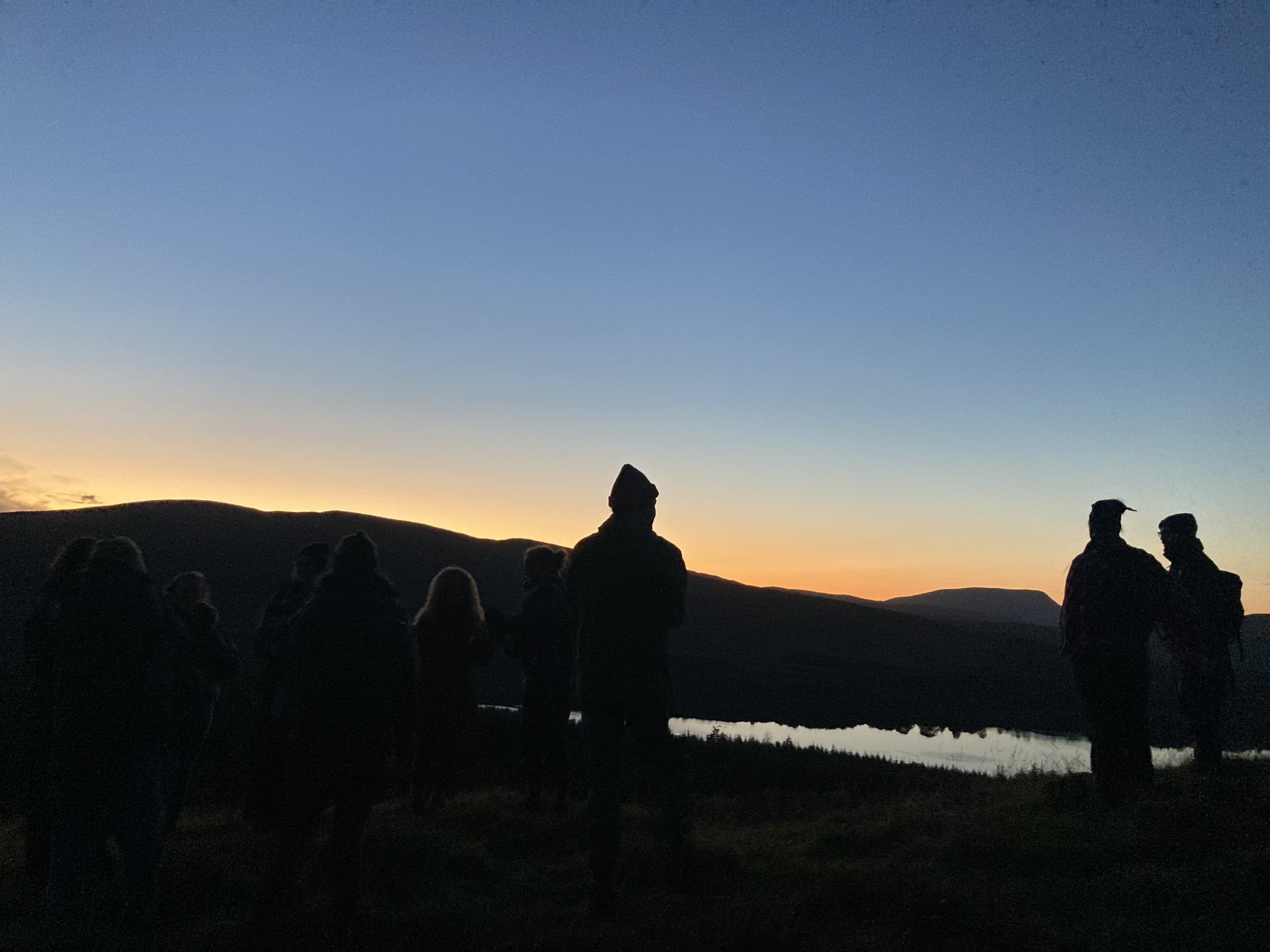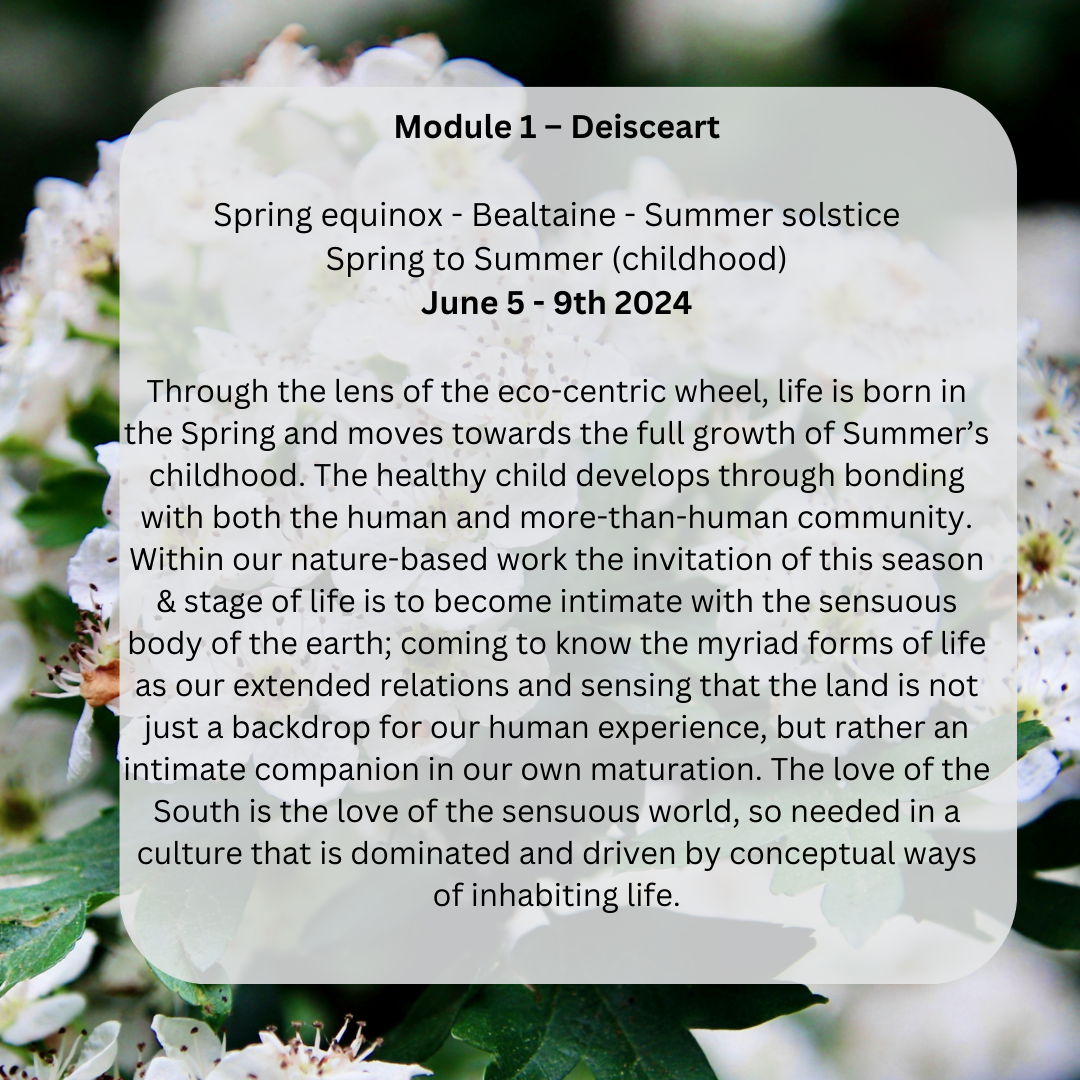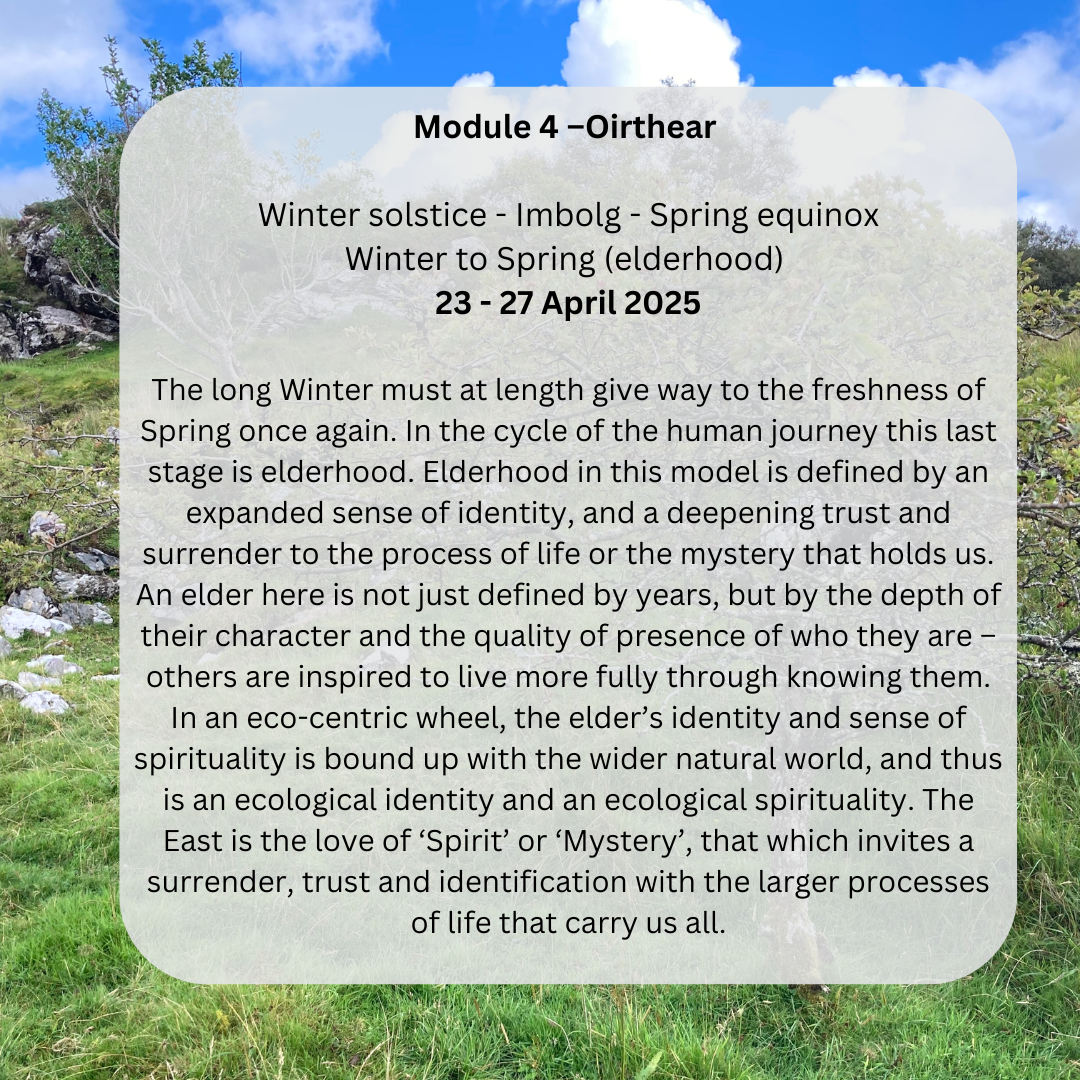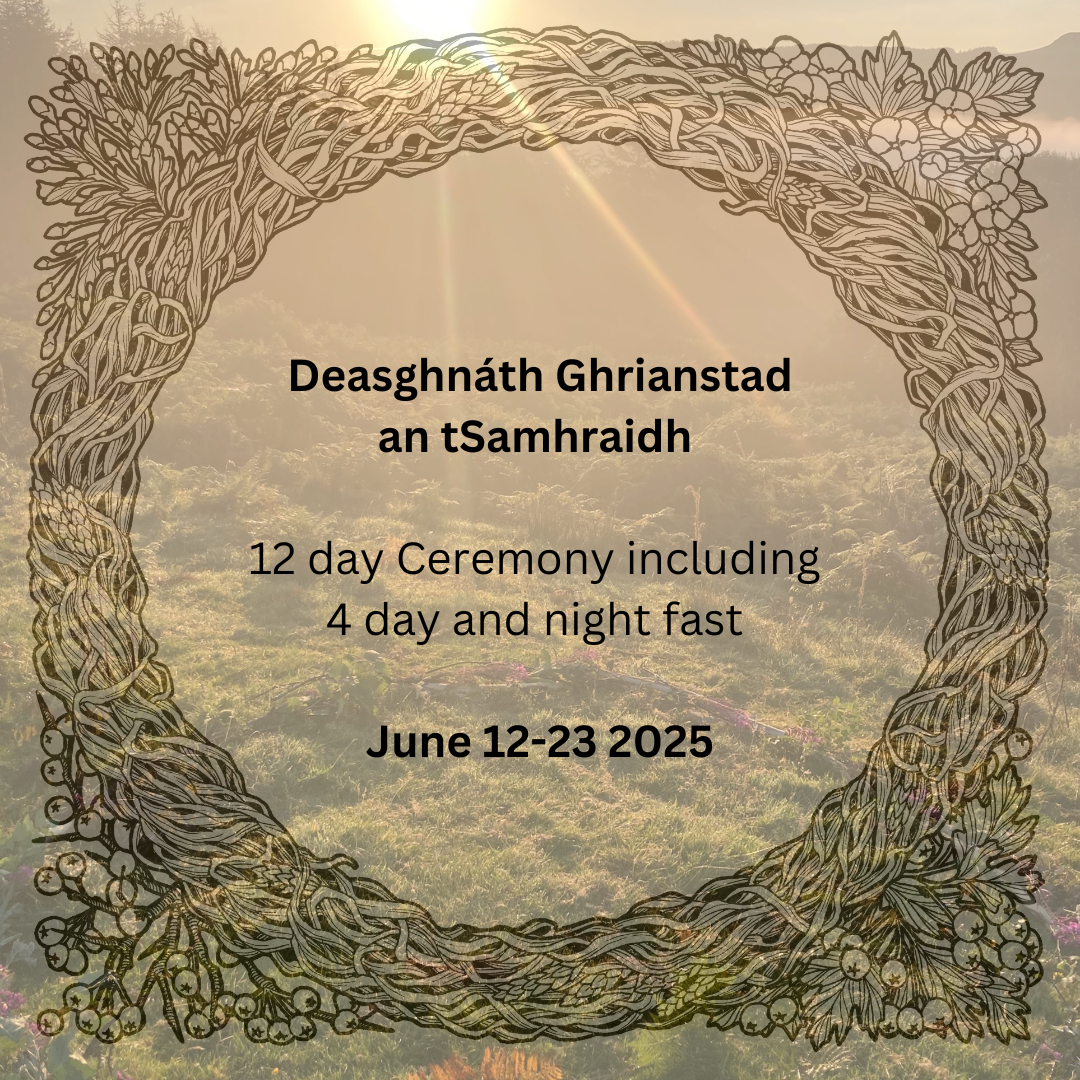
TAIRSEACH
Tending the Threshold
A year long Rites of Passage training
June 2024 - June 2025
We used to ‘know’ belonging in our bones. As a culture we have grown away from intimacy with the more-than-human world, yet it waits for us. This initiatory journey is an invitation to remember what we most deeply belong to, what we have always belonged to.
Wild Awake is excited to be offering this year-long, immersive training into contemporary Rites of Passage in collaboration with Rupert Marques. This training is suitable for people working with people of all ages and backgrounds.
Over the course of one full year, we will come together to collectively turn toward life; embracing the pain, the wonder, the wildness, the ineffable love and turbulent grief of being alive in these times. What is life asking of you? What is the sacred responsibility that we each carry in service to the greater whole? How do we go about carrying that which is hidden as a gift to others?
We gather to listen to one another, and collectively turn to the land as our greatest guide and teacher, to re-member that which John Moriarty called, our ‘silver branch perception’.
With each turn of the wheel, we will bring our hearts, heads and hands together in prayerful reverence and remember what it is to weave together our lives with the lives of our wider more-than-human kin.
Each gathering will invite tending, not just to our inner realms, but also to expand in relationship with our fellow plant and animal relations through ancestral and ceremonial craft; touching fibre, skin, root and seed.
Over the course of this full year together, through in-person gatherings and online zoom meetings, we will co-create the container in which to support our own deepening and flourishment. Laying oats and well water at the feet of Ceremony, knowing that in feeding this we are also feeding ourselves.
We will come together in the wild surroundings of North West Donegal. A land imbued with myth and knowing, a land that has known pain and loneliness, joy and promise. A land whose very being pulses in response to that which we remember in our bones.
The journey of cultural regeneration moves at the pace of ecological regeneration; and so it is that we gather to give our attention to that which ought not to be forgotten, that which feeds and grows us, and offer all that we may, in compost and in seed, toward decolonial futures and the more beautiful world our hearts know is possible.
We work at the intersections of the decolonial, ancestral and spiritual and welcome the collective enquiry that this container may hold toward the re-emergence of ancestrally significant rites of passage on this land.

About the training
This training draws on the work of pioneers in the field of contemporary wilderness rites of passage and will attend to both the experiential work of learning the skills and approaches to holding initiatory work, as well the theoretical underpinnings of this work. The training is based around a four-directions eco-centric wheel of development (see Bill Plotkin’s general overview and a summary below) and the approach to the vision fast that comes through the School of Lost Borders. https://schooloflostborders.org/
The four directions developmental wheel draws on generations of indigenous cultures’ intimacy with the wider natural world and is a model of human development that is based on careful observation and a depth of relationship with the more-than-human world. In this training we utilise the ‘wheel’ both as a model for personal development as well as a framework around which we organise the modules. Using this template, we will travel around this seasonal wheel, embarking on four threshold crossings that correspond to a particular direction and developmental task on the wheel over the course of a year. Culminating the year’s training will be a traditional twelve-day vision-fast ceremony on the land.
Each of the four courses of the ‘wheel’, as well as the vision-fast will include a land-based component supplemented by specific readings and media that underpin each module. Each module will also include an on-line webinar that precedes each course, contextualising and preparing participants for the experiential work as well as allowing us to connect with each other throughout the year. In addition, a selection of core texts for the entire course will be offered for trainees to choose from depending on their particular areas of interest within the training.
It is important to note that as trainees, you will be required to wear two ‘hats’, being both in the role of participant and trainee facilitator for each course. This will entail working with fellow course participants in both the preparation (intent) and incorporation (mirroring) phases of each threshold crossing on each module. Integral to this training is the willingness and capacity to engage with a depth of personal introspection and to attend to the processes that arise for oneself as part of this work together – this is actually the ground that matures our own ability to facilitate such work with others. In support of this the development of a supportive peer-learning community of individuals drawn to the field of initiatory land-based practice is one of the intentions of this training, and we hope that meaningful friendships and collaborations will be born out of our time together. Individual mentorship and personal guidance with the program facilitators will be encouraged throughout the year and is included as part of the program.
This course will be of particular benefit for those offering any type of wilderness solo or initiatory experience to young people or adults, through gaining exposure to and competence in the practical tools and approaches as well as the theoretical underpinnings of contemporary wilderness threshold crossings.
The wider context of this training is the inseparability between our own well-being and empowerment, and the health of our people and the wider Earth community to which we belong. Initiatory work is at heart about belonging; finding our particular place and deepening our capacity to engage in the work we are called to do in attending to the times we are living through, so that we can become a good ancestor to those who come after us.
Areas of Learning
A Deepened sensitivity, appreciation and sense of belonging to the wider natural world including the significance of our own life as an expression of nature.
Exploration of an eco-centric model of human development as a theoretical framework from which to facilitate programming in Nature based practice.
Exploring culturally significant ceremonial practices to this land and working with the elements in ceremony.
Exploring ancestral crafts to invite creative engagement with the living landscape
Exposure to a range of experiential approaches within the four directions framework and how these serve particular needs and populations.
Self-generated ceremony within the liminal space and meeting the land as ‘mirror’.
Utilising the practice of ‘Council’ throughout the training as a tool for the creation of safe container for sharing where diversity, vulnerability and honesty are foundational.
Progressive training and competence in working with integration of threshold experiences through the practice of ‘mirroring’ for empowerment and the mythologizing of story.
A deepening of personal agency through support of peer learning community and personal mentorship over the duration of a year.
Familiarity with pioneers in this field through selected readings / texts.
Experiential understanding of how the natural world can serve as a refuge and catalyst for personal maturation and individuation, supporting an increased resilience in meeting the challenges of our times.
The role of initiatory work in creating a life-affirming culture that experientially remembers the embeddedness of humans within the larger web of life.
Place
Our gatherings will take place beside Gartan Lough, County Donegal. We make our camp here on 43 acres of rewilding land on the fringes of Glenveagh National Park.
The January gathering will take place in the warm and welcome surroundings of The Song House, Falcarragh.
Time
Begins at 3pm, ends at 1pm each module.
June 5 - 9th 2024 Sept 21st - 25th 2024
29 January - 2 February 2025 (The Song House, Falcarragh)
23 - 27 April 2025 June 12-23 2025
Joining
To support us in offering places that promote a diversity of backgrounds and applications of this work, we are inviting applications for this programme.
Applications are now open and will close on March 4th. We will be in a position to offer places by March 11th.
Financial Contribution
We are offering this programme in the spirit of the Dana Economy, which you can read about here.
The basic principle of the Dana Economy is, “give what you can, take what you need”. If you can offer more, please do, so that others may offer less if needed.
Suggested donations: €2470 - €2650 - €2830
Option to pay in full or in 6 instalments of €370 / €400 / €430
Payments due on April 1st, July 1st, October 1st, December 1st, March 1st, June 1st
A non-refundable deposit of €250 is required upon booking to secure your place.
Price includes two meals (Breakfast & Dinner) each day.
Assuming we end up with a full or nearly full group of participants, we estimate that:
€2470 per person will fall short of covering our direct expenses for this program.
€2650 will cover the direct expenses of this program, including general and overhead administration costs.
€2830 will support those needing to pay on the low end of the scale, and will support further investment in program development and relationship-building with the local community and in the restoration of the land there.
Participants are asked to invest at the highest possible level when registering for the course. This helps to eliminate barriers to access for all, covers the real costs of the course, and supports right livelihood for guides and reciprocity with the local community where we will be based.
Your Guides
Rupert’s background is in environmental and outdoor education with an emphasis on experiential approaches to exploring ecological identity and personal agency. For several years he trained and guided with the School of Lost Borders (U.S.) in Contemporary wilderness rites of passage, and now offers this work here in Europe.
The other thread of Rupert’s livelihood centers on contemplative practice. He has practiced in the insight meditation tradition for over 25 years in Europe, America and Asia, and teaches at various retreat centers in Europe and beyond.
In recent years Rupert has sought to bring the fields of contemplative practice and wilderness immersion together. This has been supported by living and working at Ecodharma, a contemplative retreat community in the Spanish Pyrenees dedicated to the movements for social justice and ecological sustainability.
Rupert currently works with individuals and organizations offering a range of retreats and trainings that explore personal empowerment and resilience in service of creating a more just and beneficial human presence on this Earth.
Rupert Marques
Lucy O’Hagan
Lucy (They/She) is the founder and director of Wild Awake, an organisation which seeks to rekindle cultural and ecological resilience through the restoration or ancestral life ways in Ireland.
Lucy has been working with groups for over ten years at the intersections of the cultural, ecological and spiritual and is passionate about supporting individuals to recognise their innate gifts and true belonging with the land. Over the past 5 years, Lucy has been deepening their understanding of Rites of Passage and Vision Fast work by training with organisations such as The School of Lost Borders, Youth Passageways and Rites of Passage Journeys. Lucy’s love for ancestral skills and wisdom helps her to reweave these frameworks into the fabric of the Irish cultural and ecological landscape.
Lucy is a passionate rewilder, wildlife tracker, ethnobotanist and cave lover. Lucy lives in the Donegal Gaeltacht and enjoys swimming with seaweed and learning Gaeilge.












